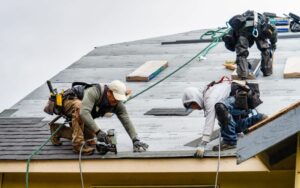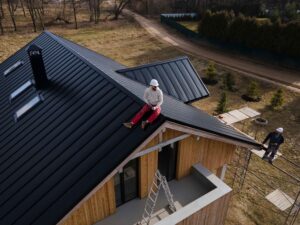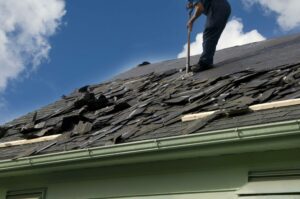Installing a roof on a 2000 sq ft house usually costs between $3,000 and $20,000. The price fluctuates based on your choice of materials, with asphalt shingles being the most economical option, while slate roofs are the priciest. Labor costs also vary, typically ranging from $50 to $150 per hour. Remember to factor in permits, inspections, and potential unexpected expenses. For more insights on managing your roofing costs effectively, there’s plenty more to explore.
Factors Influencing Roofing Costs
When it comes to roofing a 2000 sq ft house, several key factors can greatly influence the overall cost. First, the choice of materials plays a significant role; high-quality shingles or tiles may yield better durability but at a higher price. Next, labor costs can vary based on local market rates and the complexity of your roof’s design. Current roofing trends, such as eco-friendly materials or advanced insulation, can also affect your cost estimation. Additionally, the roof’s pitch and existing structural conditions may require additional reinforcement, impacting overall expenses. Finally, geographic location influences costs due to regional pricing and climate considerations. Understanding these factors helps you make informed decisions about your roofing project.
Average Cost of Roofing Materials
Although various factors can influence the average cost of roofing materials, you can expect to pay between $3,000 and $10,000 for a 2000 sq ft house, depending on your chosen material. The most common roofing material types include asphalt shingles, metal, tile, and slate, each offering unique benefits and price points. Asphalt shingles typically range from $3,000 to $5,000, making them the most economical option. Metal roofs can cost between $5,000 and $12,000, while tile roofs often fall between $8,000 and $15,000. Slate roofs, known for their durability and aesthetics, can set you back anywhere from $10,000 to $20,000. Understanding these average material prices will help you make an informed decision for your roofing project.
Labor Costs for Roof Installation
Understanding labor costs for roof installation is vital, as they can substantially impact your overall budget. Labor rates typically range from $50 to $150 per hour, depending on your location and the complexity of the job. Skilled laborers may charge more, reflecting their expertise in various installation techniques. For instance, a simple asphalt shingle installation may require less time and labor compared to more complex materials like slate or metal roofing. A 2000 sq ft roof could take anywhere from two to five days to complete, further affecting labor costs. It’s important to obtain multiple quotes from contractors to guarantee you’re getting a fair price while also considering the quality of workmanship and experience involved.
Permits and Inspections
Before starting your roofing project, it’s crucial to check if you need any permits or inspections, as these can affect both your timeline and budget. Most municipalities require building permits for roof replacements, and the costs associated with permit fees can vary greatly, often ranging from $100 to $1,000. Additionally, you’ll need to familiarize yourself with local inspection requirements. Some areas mandate inspections at various stages, such as before installation and after completion, to guarantee compliance with building codes. Ignoring these steps could lead to costly delays or fines. Always consult your local building department to determine specific regulations and fees, making sure your roofing project proceeds smoothly and within legal parameters.
Additional Expenses to Consider
When budgeting for your roofing project, it is essential to account for additional expenses that may arise beyond the basic material and labor costs. You’ll need to take into account waste disposal fees, as removing old roofing materials can add to your total. Many contractors charge for the disposal of shingles, underlayment, and other debris.
Unexpected repairs can also crop up during the project. Hidden damage, such as rotting wood or structural issues, may necessitate extra work and materials. It’s wise to set aside a contingency fund—typically 10-20% of your overall budget—to cover these unforeseen expenses. By planning for these potential costs, you’ll avoid financial strain and guarantee your roofing project stays on track.
Types of Roofing Materials
Choosing the right roofing material is essential for ensuring your home’s durability and aesthetic appeal. Metal roofing is a popular option due to its longevity and resistance to harsh weather conditions. It can last 40-70 years and requires minimal maintenance, making it a practical choice. On the other hand, tile roofing offers a classic look and exceptional durability, often exceeding 50 years. It’s fire-resistant and energy-efficient, but installation can be labor-intensive, which might increase costs. Both materials have unique benefits, so consider your climate, budget, and design preferences when making a decision. Ultimately, the right choice will enhance your home’s value and performance for years to come.
DIY vs. Hiring a Professional
Deciding whether to tackle your roofing project yourself or hire a roofing professional can considerably impact both the cost and quality of the final result. If you choose the DIY route, you’ll need to invest in essential DIY tools such as a nail gun, ladder, and safety gear. However, roofing safety should be your top priority; improper techniques can lead to accidents or costly mistakes. On the other hand, hiring a professional might raise your initial expenses but guarantees that the job is done correctly and efficiently. Professionals come equipped with experience, insurance, and specialized tools, minimizing risks. Ultimately, weigh your skills, budget, and the complexity of the project to make the best choice for your roofing needs.
Seasonal Considerations for Roofing Projects
Although roofing can be done year-round, certain seasons present unique challenges and advantages that can greatly affect your project. In winter, cold temperatures and winter weather can hinder materials’ adhesion and cause safety hazards for workers. Snow and ice accumulation may also delay your project timeline. On the other hand, summer heat can lead to thermal expansion issues, which could affect shingle installation. High temperatures may also increase the risk of heat-related illnesses for laborers. Ideally, spring and fall offer moderate weather conditions, allowing for ideal installation and minimal disruptions. Before scheduling your roofing project, consider these seasonal factors to guarantee a smoother, more efficient process that meets your needs.
Tips for Budgeting Your Roofing Project
Budgeting for your roofing project requires careful planning to avoid unexpected costs and guarantee you get the most value from your investment. Start with a detailed cost estimation that includes materials, labor, and any additional services like disposal or inspections. Research local contractors and gather multiple quotes to compare pricing and services offered. Don’t forget to factor in permits and potential unexpected repairs that might arise during the project. Establish a budget planning strategy that allocates a buffer for these unforeseen expenses, ideally 10-15% of your total budget. Additionally, consider the timing of your project, as seasonal pricing can fluctuate. By following these steps, you’ll make certain your roofing project stays within your financial limits while achieving quality results.
How much does it cost to put a roof on a 2000 sq ft home?
new roof cost
roof replacement cost
new roof costs
roofing
roofing
roof
roof
roof
roof
roof
roof
roofer
flat roof
flat roof
flat roof
roofing material
roofing material
roofing material
roofing material
roofing material
roofs
roofs
roofs
roofs
roofs
roofs
roofs
roofs
roofing materials
roofing materials
roofing materials
roofing materials
roofing materials
roofing materials
roofers
roofers
roofers
roof deck
flat roofs
flat roofs
roof truss
roofing shingles
tile roof
tile roofing
tile roofing
tile roofs
tile roofs
tile roofs
roof shingles
roof shingles
roofing tiles
slate roofing
metal roofing
metal roofing
shingle roof
metal roof
metal roof
roof shingle
slate roof
cost of living
rubber roofing
metal roofs
metal roofs
metal roofs
roof pitch
roof pitch
roof pitch
cost
cost
cost
cost
cost
cost
cost
cost
cost
cost
cost
cost
cost
cost
cost
cost
cost
cost
cost
cost
cost
cost
cost
cost
cost
cost
cost
cost
cost
cost
cost
cost
cost
cost
standing seam metal roofs
average cost
average cost
average cost
average cost
average cost
average cost
average cost
average cost
costs
costs
costs
costs
costs
costs
costs
costs
costs
costs
costs
costs
costs
costs
costs
costs
costs
costs
costs
costs
costs
costs
costs
costs
cedar shake roof
ceilings
architectural shingles
architectural shingles
solar shingles
prices
prices
prices
prices
replacement costs
replacement costs
replacement costs
replacement costs
replacement costs
sq.ft.
chimneys
architectural shingle
architectural shingle
architectural shingle
$1.85
wood shingles
truss
price
price
price
price
square footage
square footage
square footage
square footage
square footage
square footage
square footage
square footage
square feet
square feet
square feet
square feet
shingles
shingles
shingles
shingles
shingles
shingles
shingles
shingles
shingles
shingles
shingles
shingles
shingles
shingles
shingles
shingles
shingles
shingles
shingles
shingles
homeowners
homeowners
homeowners
asphalt shingles
asphalt shingles
asphalt shingles
asphalt shingles
asphalt shingles
asphalt shingles
asphalt shingles
expenses
expenses
expenses
expenses
how much does it cost to put a roof on a 2000 sq ft house?
roof cost
roofing costs
roofing costs
new roof cost
new roof cost
roof replacement cost
roof replacement cost
roof replacement cost
roof replacement cost
roof replacement cost
roof replacement cost
roof installation cost
roofing installation costs
roof estimate
roof truss costs
total roofing expense
1,000-square-foot roof
1,500-square-foot roof replacement
roof replacement expenses
square foot roof
square foot roof
square foot roof
roof replacement average
roof area
typical roof
roof size
roof square footage
roof square footage
roof square footage
roofing options
roofing options
roof replacement
roof replacement
roof replacement
roof replacement
roof replacement
roof replacement
roof replacement
roof replacement
roof replacement
roof replacement
roof replacement
roof replacement
roofing
roofing
roofing
roofing
roofing
roofing
roofing
roofing
roofing
roofing
roofing
roofing
roofing
roofing
roofing
roofing
roofing
roofing
roof installation
roof installation
size.roof
roof space
full roof replacement
full roof replacement
old roof
old roof
old roofing
roof material
roof material
roof replacement project
roof replacement project
roof replacement project
roof replacement project
roof replacement project
roof size.roof size
partial roof replacement
partial roof replacement
partial roof replacement
flat roof range
mid-range roof replacement
roof repairs
overall roof replacement
expensive metal roofing
quality roof replacement
common roof material
local roofing contractors
diy roof replacement
diy roof replacement
roofing price quotes
roof installations
old roofing materials
old roofing materials
higher-end roof replacement
current roof
roof replacement jobs
proper roofing system
roofing contractor
roofing contractor
roofing contractor
unique-looking roofing options
roofing contractors
roofing contractors
roofing contractors
roofing contractors
roofing contractors
roofing contractors
roof type
roof type
chosen roof material
common roofing materials
old roofs
roof replacement page
new roof
new roof
new roof
new roof
new roof
new roof
new roof
roof damage
roof damage
1,000-square-foot house
roof replacement service
roof repair
roof repair
choose roofing materials
metal roof option
tile roof range
roof replacements
underlying roof structure
underlying roof structure
popular roofing materials
architectural shingle cost
roof inspections
structural roof issues
professional roofing contractors
reputable roofing contractors
reputable roofing contractors
reputable roofing contractors
reputable roofing contractor
roofing industry
roof tear-off
roof removal
roof removal
durable roofing choices
roof installation team
roof/ridge
sloped roof
roof pitch multiplier
roof pitch multiplier
mid-range metal roof
intricate roof designs
skilled roofers
professional roof repair
copper roofing
living costs
high cost
newer roofs
sloped roofs
sloped roofs
asphalt shingle roof
roofing project quote
roofing project quote
asphalt roof shingles
seam metal roofs
shingle costs
installation cost
installation cost
trustworthy roofing materials
installation costs
installation costs
average installation costs
corrosion-resistant roofing material
clay tile roofs
clay tile roofs
average costs
average costs
average costs
attic ventilation
average cost
average cost
average cost
average cost
average cost
average cost
average cost
average cost
typical cost
material cost
costs
costs
costs
costs
costs
costs
costs
costs
costs
costs
costs
costs
costs
costs
costs
costs
costs
costs
costs
costs
costs
costs
house
house
two-story homes
overall cost
overall cost
overall cost
3,000-square-foot home needs
total cost
total cost
4 and $40 per square foot
project cost
material costs
possible price
possible price
higher-cost materials
average home size
square foot home
overall costs
cost range
cost range
cost range
cost range
epdm rubber roofing
significant cost
exterior material
prices
prices
prices
prices
average cost range
sq.ft
sq.ft
average prices
cost-effective solution
replacement cost
replacement cost
replacement cost
replacement cost
modern homes
typical cost range
cooling costs
disposal costs
home size
home size
roof replacement costs
composite shingles
composite shingles
standard-sized home
total replacement costs
potential repair costs
architectural asphalt shingles
shingle installation
significant costs
u.s. homes
additional costs
repair cost
average ballpark price
repair costs
repair costs
expensive parts
price change





